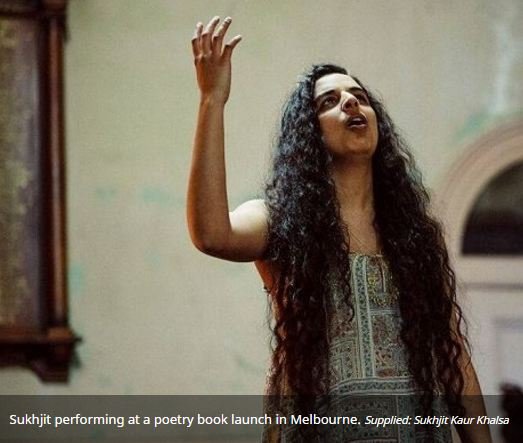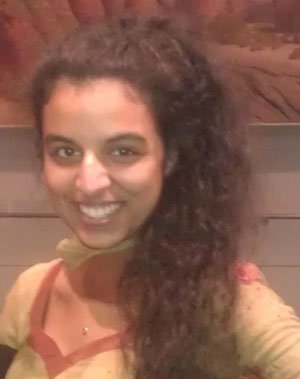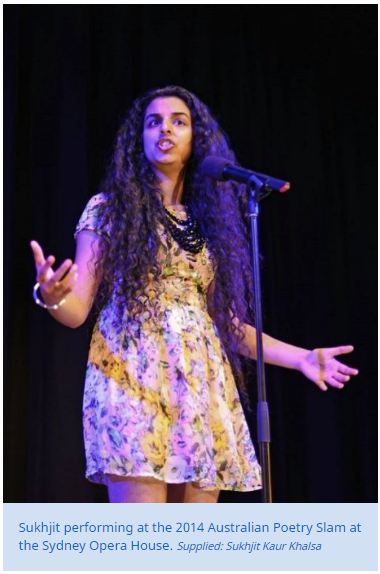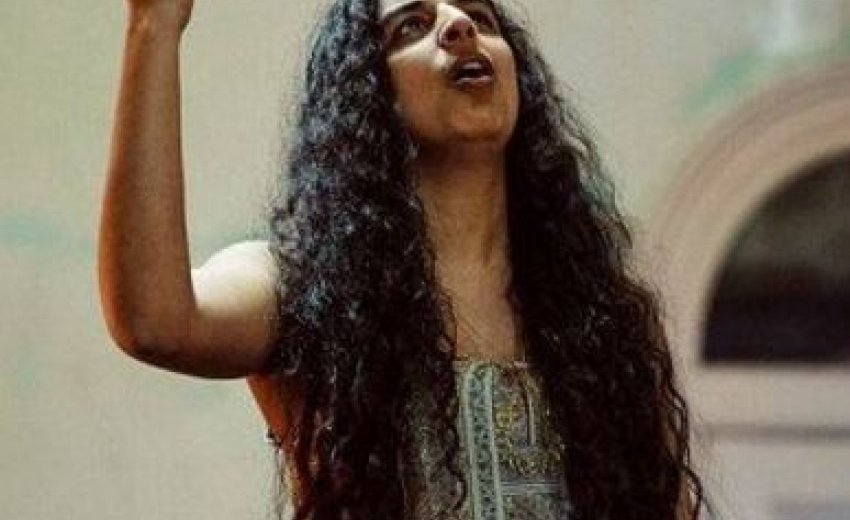
Sukhjit Kaur Khalsa is a spoken word poet and Sikh activist. Her poem about her and her family’s experience of racism and discrimination in Australia shot her to fame on the television show, Australia’s Got Talent. With charisma and humour, Sukhjit shared with her audiences her vision of a “warm Australia” and highlighted the 150 year history of Sikhs in Australia.
As a child, what did you dream of doing?
“My earliest memory is that I wanted to be a masseuse. And then I wanted to be a physiotherapist.”
Why did you study politics at university?
“I wanted to make change in this world and I thought that I wanted to work in the United Nations or in politics in Australia. I did my degree, but at the back of my mind I always had a love for drama and wanted to be an actress. I didn’t really share that with anyone.
I think that comes from not seeing myself, or people like me, on TV. Or not seeing Sikh role models in Hollywood, or even people of Indian descent who aren’t afraid of being themselves and aren’t afraid to be true to their roots and be cool about their heritage."
"I thought that if I were to enter the performing arts world, I’d be hit with so many challenges. I was scared to do anything about that dream. And then I fell into spoken word.”

What is spoken word?
“It’s about bringing poetic devices — like rhythm and flow — from text to stage. It’s the performance of poetry.”
How did you first hear about spoken word poetry?
“During uni, I went on exchange to Prague. These girls came up to me and said, “have you heard of spoken word? The way that you talk is like spoken word!” And I was like, “what’s that? I’ve never heard of it”. We googled it and found a TED talk by Sarah Kay, a spoken word artist in the United States. It blew my mind."
Why is poetry important to you?
“It’s ultimate expression. It takes vulnerability and courage, which is why spoken word poetry is so important to me. With poetry, I can express myself to the fullest.”
This video contains coarse language.
Watch Sukhjit perform the poem 'Advance Australia Fair' in Melbourne. She also performed this poem for her Australia's Got Talent audition in February 2016. YouTube: Melbourne Spoken Word
A lot of people might be surprised to hear that Sikhs have a long history in Australia, which was the topic of your Australia’s Got Talent audition. How did you learn about this history?
“I come from a cool family that has always been proud of their identity. Even though my parents left India 40 years ago, they’ve kept a lot of traditions that have made me who I am today. One of their lessons was to learn about my heritage and be informed about what I’m talking about."
 "My brother is one of my biggest role models. He started an organisation called Australian Sikh Heritage. He exposed me to the history of Sikhs in Western Australia. He battled with having a turban and beard, and started researching Sikhs in Australia. He researched and learnt about their involvement in WWI and WWII, and how they came to Australia [in the late 1800s] as cameleers and hawkers. I’m surprised that not many people know about this and it’s been a forgotten history.
"My brother is one of my biggest role models. He started an organisation called Australian Sikh Heritage. He exposed me to the history of Sikhs in Western Australia. He battled with having a turban and beard, and started researching Sikhs in Australia. He researched and learnt about their involvement in WWI and WWII, and how they came to Australia [in the late 1800s] as cameleers and hawkers. I’m surprised that not many people know about this and it’s been a forgotten history.
When I started my own poetry, I wanted to bring in that history. It’s such a cool fact. It’s a great conversation starter when someone is being racist to you — it’s the best way to respond!”
In preparing for your Australia’s Got Talent audition, how did you balance your anger about a situation like someone ripping off your uncle’s turban, with a hopeful view about Australia?
“It’s really important to use irony, sarcasm, humour — along with anger. Otherwise people can feel excluded or shut out. Also, the point of my poetry is never to blame. I have no right to blame anyone. But it’s important to not be too nice because the truth and harsh reality need to be confronted head on.
Australia’s Got Talent is a reality and entertainment show. But [performing on] it represented Australia having faith and believing in me. The hate has been very minimal and I expected so much more. There are some trolls. But this experience has taught me that there’s a lot of love out there. We assume that the majority are the haters or racists. But I have a lot of hope that everyday Australians are willing to embrace each other."
Imagine that you had the chance to host a barbeque – anywhere in Australia. If you could invite three Australian guests (dead or alive) – who would they be? What would be on the menu? Where would you like it to be held?
“I’m obsessed with Deborah Mailman [Indigenous actress]. I’m a massive fan girl and would love to invite her. I’d also invite Missy Higgins [singer/songwriter]. My role models are definitely in the arts.
To make things interesting, I’d also invite Gough Whitlam [former Australian prime minister]. It’d be weird mix but I think he did so much for Australia and Indigenous Australians. He brought so much social change to the country. He was a great leader — for women and minorities.
I went to Lorne and I was driving along the Great Ocean Road. There was a lodge in the hills that had epic views overlooking the ocean and a beautiful cliff. It was serene and peaceful. I would hire out a room with a view and hold it there.
I’m a vegetarian. I’d make everyone eat vegetarian food. If I’m hosting it, I want to be able to eat. When I was in year three, someone said that they couldn’t invite me to their birthday because their mum didn’t know what to cook. So it’d be great to make it a vegetarian cook-off.”
What would be your advice to your 15-year-old self?
“This is all temporary — being a teenager, going through high school, and any insecurities about body image and self esteem. It’ll pass and it’ll all be fine. We come out the other end, stronger and wiser.”
Sukhjit Kaur Khalsa will be performing in Melbourne on Saturday 29 October 2016 as part of Confluence: Festival of India in Australia.
